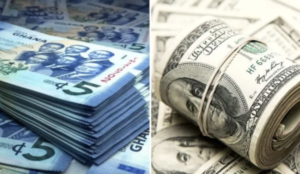
The Ghanaian cedi has depreciated by an alarming 74% against the US dollar over the past three years, according to new figures from the Institute of Economic Affairs (IEA).
This trend, which the IEA describes as “a huge depreciation by all standards,” underscores the depth of the currency’s volatility and hints at further pressures ahead.
The cedi’s value declined by 30% in 2022, followed by 27.8% in 2023, and has already dropped nearly 29% against the dollar in 2024.
The currency’s persistent slide reflects a range of structural vulnerabilities, from global economic shifts to local political and fiscal pressures.
With elections on the horizon, concerns over the continuity of Ghana’s IMF programme and foreign debt negotiations are likely to further weigh on the cedi.
Political uncertainty surrounding Ghana’s upcoming election is expected to drive demand for the dollar as a safe-haven asset.
The IEA warns that this flight to safety may accelerate cedi depreciation in the final months of the year as investors hedge against potential political shifts that could unsettle Ghana’s fiscal and monetary policy frameworks.
Ghana’s three-year IMF programme, essential to stabilising the economy and attracting foreign investment, now faces potential risks tied to the election outcome.
Concerns over whether a new administration would maintain IMF policies could stoke further demand for hard currency. Any deviation from the programme could also impact disbursements, which are crucial for Ghana’s foreign exchange reserves and, consequently, the cedi’s stability.
Adding to this uncertainty, the IMF’s third review of Ghana’s programme has been delayed until December 2, 2024, as confirmed by Finance Minister Dr. Mohammed Amin Adam.
While IMF staff completed an internal review in October, the IEA described the board’s December date as “belated,” suggesting that the lag in assessments may create additional risks for investor sentiment and capital inflows.
Ongoing debt negotiations with non-Eurobond commercial creditors also pose risks. Should these talks stall, Ghana could face delays in IMF disbursements and other associated inflows, leading to tighter FX liquidity and, subsequently, added pressure on the cedi.
Moreover, Ghana’s cocoa sector—an important contributor to foreign exchange inflows—is likely to face headwinds due to a subdued crop yield and COCOBOD’s plans to shift towards domestic financing for cocoa production.
The IEA further notes that a smaller syndicated loan could weaken foreign exchange inflows, further straining Ghana’s external balances.
Beyond the immediate challenges, the IEA emphasizes the need for deep structural reforms to address Ghana’s persistent foreign exchange imbalance. “Bridging the perennial FX supply-demand gap will require decisive macroeconomic reforms,” the IEA said, highlighting the need for measures that strengthen Ghana’s fiscal and economic resilience.
